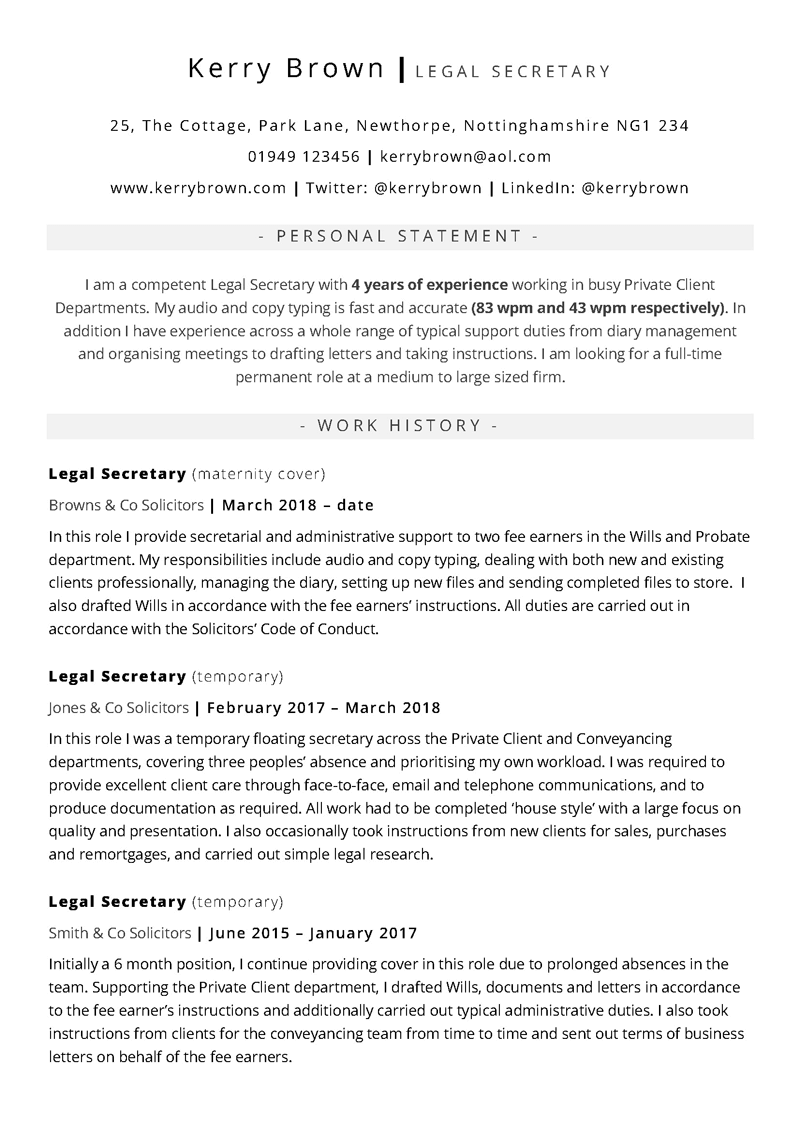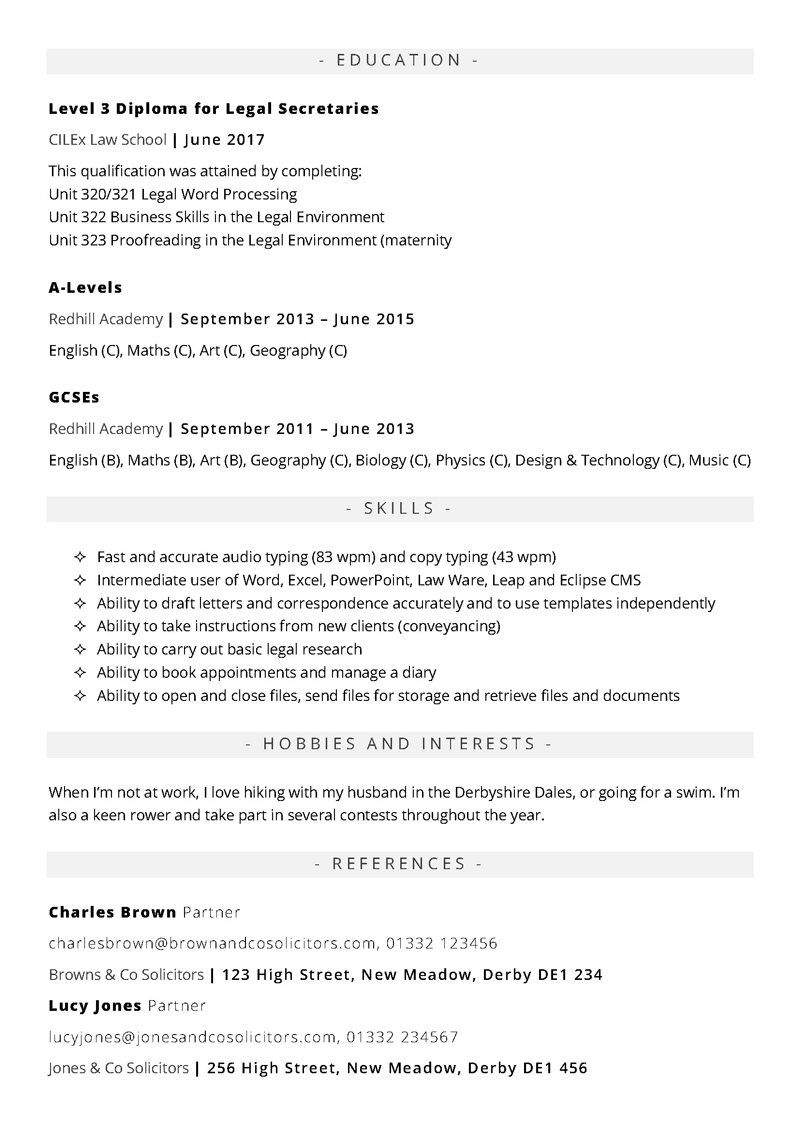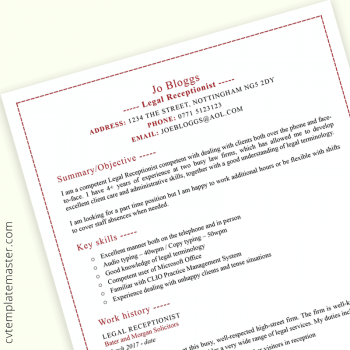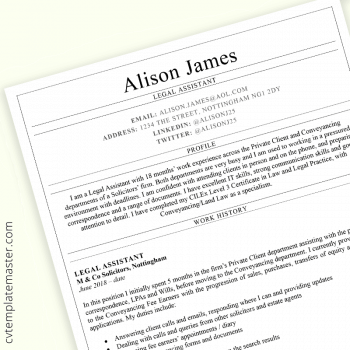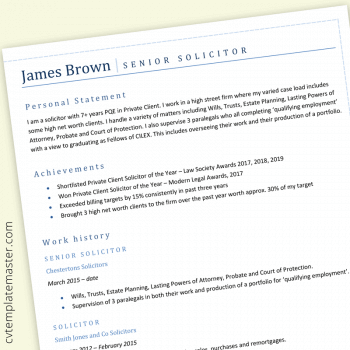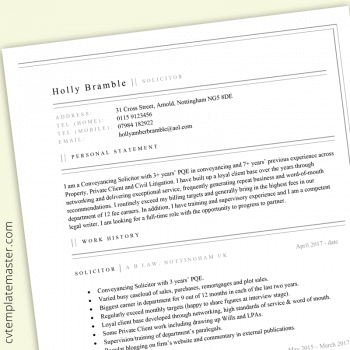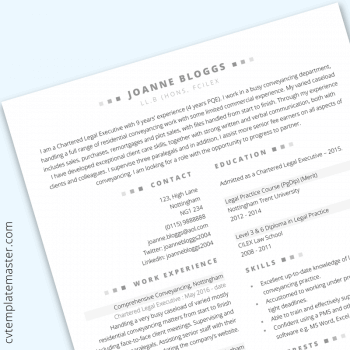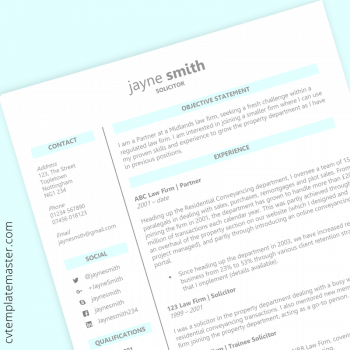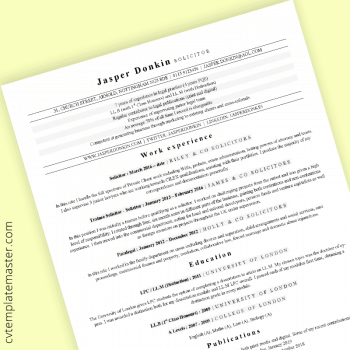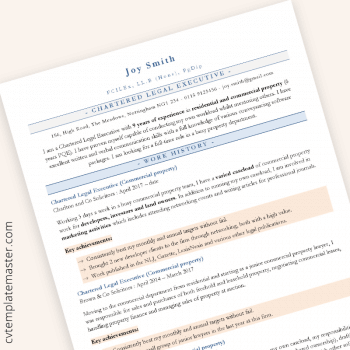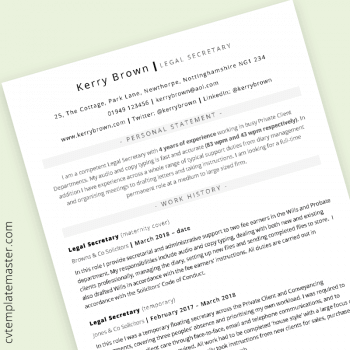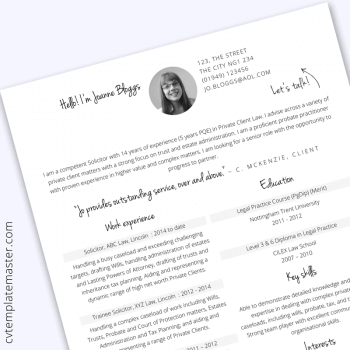How to write a law CV
In this guide which has been prepared by a FCILEx previously responsible for legal recruitment, we’ll explain how to write a CV for the legal sector in 2019, with guidance for you whether you’re a law student, law graduate, seeking a training contract or an experienced solicitor. We’ll walk through what to include, step-by-step, with points to note for each different type of applicant.
(1) Contact information
For all roles, provide:
- Name (first and last)
- Postal address (home)
- Email address (nothing silly)
- Phone number(s)
- If the job involves travel and you have a full, clean driving licence, it is worth mentioning this here.
If you are a practising lawyer, you should also provide details of your LinkedIn and Twitter accounts. Your LinkedIn profile should be completed fully, and your Twitter account should show evidence of recent activity within the legal sector, ideally focused on your field of expertise (following relevant people and sharing relevant content, for example).
To supercharge your LinkedIn profile, check out our guide: Building a killer LinkedIn profile to complement your CV
As a lawyer, aspiring lawyer or someone working in the legal sector, you’ll already know NOT to talk about protected characteristics, unless they are highly relevant to the job. These are:
- Age
- Disabilities
- Gender
- Gender reassignment
- Marital status / civil partnership
- Pregnancy or the fact you recently had a baby
- Race
- Religion or belief
- Sexual orientation
While employers in theory should not discriminate against you, discrimination unfortunately does still happen, even in the legal sector.
(2) Personal statement
Your personal statement is a short introductory paragraph which is ‘you in a nutshell’. It is sometimes referred to as something else, such as ‘Profile’, ‘Intro’, ‘Mission’ or ‘Objective Statement’.
It should tell the prospective employer:
(a) Who you are
(b) Why you are a perfect fit for this particular job and this particular firm
(c) What you’re looking for
It’s absolutely critical that you write your personal statement with reference to the job advert and address specifically what your target employer is looking for, rather than what you think are your best selling points.
Here are two examples:


“What are they looking for?”
The job advert will give you a good understanding of what the recruiter is looking for in relation to the specific role you’re applying to. However, there are certain bits of information and skills that legal recruiters generally expect to see.
Here are some questions for fee earners to consider when writing the personal statement:
- When did you qualify?
- How many years of experience do you have before and after qualification? Write it like this: “8 years’ experience (5 years PQE)”
- What areas have you practised in?
- What have you specialised in?
- What has your case load looked like?
- Have you dealt with high value / complex transactions?
- Did you supervise less senior members of staff? If so, how many?
- Do you have any higher level qualifications? (e.g. Masters, PhD)
- Have you taught law or delivered training?
- Do you network with other law firms?
- Do you write/blog for your current firm’s website?
- Are you familiar with any types of practice management system?
Note that not every question is relevant to every role. Study the job advert carefully and read the firm’s website for an insight into what’s important to the specific employer you’re targetting.
Here are some questions for support staff to consider when writing the personal statement:
- What areas of law have you worked in? (it may be an advantage if you have worked across different areas of law as you’ll have an understanding of the jargon, forms and processes in different areas)
- Did you support a single fee earner or a group?
- Did you work in a very busy department with a high level of demand?
- What is your current typing speed? (copy + oral)
- What sort of tasks have you undertaken? e.g. diary management, billing, drafting letters and documents, handling calls, proofreading, using a PMS, writing articles for the company’s website, taking instructions on simple matters, attending court, preparing litigation bundles, writing reports, conducting legal research etc.
Some of the above information should be included in your personal statement where it is relevant to the specific role. Other aspects can be incorporated into your work experience section.
(3) Work experience
Your work experience section should be completed in reverse chronological order (i.e. most recent first). If you have no work experience at all, check out our guides to writing a student or school leaver’s CV (with free downloadable templates and example content).
Fee earners should include details such as their case load and targets they have met, where applicable.
(4) Education
Employers will expect to see the education section completed fully for students/graduates, practising lawyers and support staff. It is fine to include pending qualifications with a predicted grade, provided that you have made it clear that the qualification has not yet been awarded.
NB: As at June 2019, qualifications in law are changing. The usual route to qualification as a solicitor – LL.B, LPC and then training contract – is being phased out in favour of a new super exam – the SQE. The details are still not clear but you should factor in these changes before undertaking a new qualification.
(5) Skills
Your skills section can go either below the personal statement or below your education. We would suggest law students and law graduates put this section below their personal statement as it is more important, given that they will have less or no formal work experience to boast of.
There are a wide range of skills that make a good lawyer or legal administrator. The job advert may request some specifically, but you shouldn’t simply list them off on your CV. Instead you need to give examples of how you have acquired and used those skills.
Relevant skills for lawyers include:
- Exceptional communication skills, both oral and written (examples: work you have completed – make sure you redact client information from it, article/blog contributions, presentations you have delivered, training seminars you have delivered, brochures/guides you have written)
- An interest in and passion for law (examples: article/blog contributions you have written, involvement in legal interest or rights groups, your dissertation, activity on LinkedIn and Twitter that shows you are immersed and involved in the industry)
- Commercial awareness
- Skills in research and analysis using databases such as Westlaw/Lexis/Practical Law (examples: researching for dissertation, blog/articles, client matters – ensure you redact client information from anything provided)
- Problem-solving skills
- Accuracy and attention to detail
- Numeracy and IT skills
- Stamina and resilience
- Time management skills with the ability to plan work and prioritise tasks
- Interpersonal skills, to work as part of a team or with other people and organisations
- The potential to lead and delegate responsibility (examples: responsibility for less senior members at firm)
- Flexibility and openness to new ideas
- Resilience and self-confidence
- A professional approach to work, integrity and a respect for confidentiality.
- Additional language skills are usually beneficial.
Source – adapted from Prospects.ac.uk.
Relevant skills for legal support staff include:
- Superb written and verbal communication skills
- The ability to multitask
- Excellent attention to detail
- Legal research skills (with databases such as Westlaw)
- The ability to work well under pressure and to tight deadlines
- Office administrative skills for tasks such as filing, typing and letter writing (give typing speed both for copy typing and oral)
- Good teamwork skills
- Flexibility and adaptability
- An understanding of client needs (gained through working across different departments)
- Professionalism both towards colleagues and clients
- Additional language skills are beneficial
Source – adapted from Prospects.ac.uk.
In all cases, don’t simply list off the skills you claim to have but provide examples – e.g.
“I worked in a pool of 5 secretaries, serving 15 fee earners.. Working with the other secretaries in a busy conveyancing department helped me develop strong teamwork and communication skills as we collaborated to ensure all matters were dealt with promptly and with a high standard of client care.”
(6) Hobbies and interests
Not everyone includes a hobbies and interests section but in many cases, it is a lost opportunity if this is excluded. Hobbies and interests can demonstrate to an employer that:
- You take an interest in your personal health/fitness (such as going to the gym)
- You’re involved with activities that may complement your work as a lawyer (such as running a community project or participating in a debating team)
- You are developing other soft skills that are transferable to the work place (such as leading a sports team, public speaking or juggling several commitments)
(7) References
You’ll be expected to provide two references. The first is always your current employer. If you don’t want to give their details until you have an acceptable job offer, it’s fine to leave off this section or write ‘references available on request’.
The second reference needs to be a suitable professional person such as a course supervisor or another senior lawyer (not at your current firm) who has knowledge of your work. Dropping in the name of a highly respected lawyer can earn you some brownie points (be sure to ask them first if they’re willing to provide a reference!)
Another tactic that can give your CV a boost is to obtain a couple of reference quotes in advance and include these on your CV. Effectively it’s like having people vouch for you in advance and if you choose the right people, it can really grab an employer’s attention.
Example Law CV template:
Here’s an example of a Legal Secretary CV. You can find more law CV templates above, all available for download free without registration.
